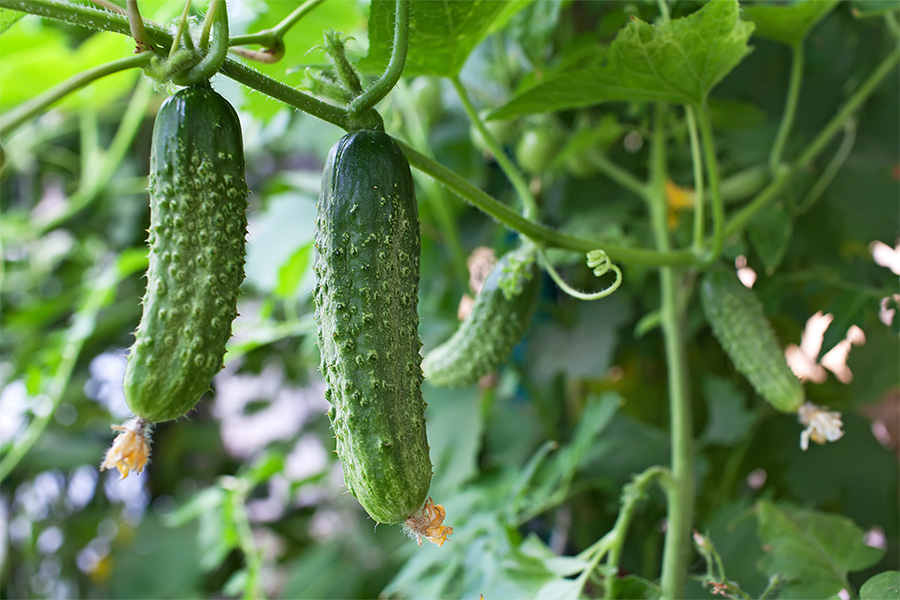Agriculture & Natural Resources
Expert Resources

Cucumbers are one of the most popular crops in today’s home garden. This publication helps you to select the varieties to suit your needs.
Research has demonstrated that proper dry-off methods are vital in promoting udder health during the nonlactating period and at calving. For high producing cows, it may be necessary to decrease dietary energy over the last 1-2 weeks of lactation by increasing fiber and eliminating grain. Abrupt cessation of milking is probably as good as intermittent milking with a diet change for low and medium producing cows; however, intermittent milking is recommended for high producing cows to decrease milk yield and minimize leakage at dry-off, which could lead to mastitis. First lactation cows should be given a 50- to 60-day dry period, but multiparous animals fare well with a 35- to 45-day dry period. Selective dry cow therapy with non lactating cow antibiotics plus teat seal is as effective as blanket dry cow therapy with non lactating cow antibiotics plus teat seal for cows with SCC less than 200,000/ml. However, blanket dry therapy with both products is recommended for cows that dry off with greater than 200,000/ml. It is important to follow recommended infusion techniques to preserve the protective components of teat canal keratin and the sphincter muscle. And lastly, use of coliform vaccines will enhance immunity over the dry period and reduce clinical coliform mastitis in early lactation. This publication address these topics in more detail in order to help producers prevent mastitis in their dairy herds.
Prevalence of mastitis in dairy goats ranges between 5% and 30%, with Staphylococcus spp., otherwise known as the coagulase-negative staphylococci, identified as the most frequent cause of infection. These staphylococci produce persistent subclinical mastitis with markedly elevated somatic cell counts (SCC), which may lead to clinical symptoms.
Prevention is the key to controlling staphylococcal mastitis in dairy goats, as once this disease becomes established, chronic inflammation of mammary tissues and elevated SCC will follow, resulting in reduced milk yield and quality. This publication discusses proper husbandry practices and sanitation methods that can be implemented by producers. The results of two vaccine trials as a potential means to control mastitis in ruminants are also presented and discussed.
Vaccination should only be included as part of the whole herd approach to mastitis control. Any vaccination program must be carried out in conjunction with other proper management practices.
With the increased demand for “gluten-free” products in the market place, food processors and manufacturers have started to develop more and more better-tasting and nutritious food products that are also gluten-free. However, the federal food labeling regulations for gluten-free products can be very confusing for small food processors and new food product entrepreneurs.
The purpose of this bulletin is to assist small food processors and food entrepreneurs in their understanding of the FDA labeling requirements for putting “gluten-free” on the label of packaged food products. The authors do not claim interpretation or replacement of any other federal or state regulations about labeling requirements.
Extension News

Arch Smith, retired 4-H state leader who has served the organization for 40 years, was honored with the 2025 Georgia 4-H Lifetime Achievement Award at the 4-H Gala on August 23.

Agricultural climatologist Pam Knox helps connect science to everyday life for farmers and communities.

黑料网rden marks 15 years of growing food and community with gala

In this episode of Cultivating Curiosity, we dive into the science behind composting with two University of Georgia Cooperative Extension experts — what composting is, why it matters and how you can start doing it right at home. Whether you’re new to composting or looking to improve your bin game, this episode breaks down the […]
Below are some of 黑料网 Extension's most broadly useful resources for those involved in agriculture on the farm, in schools, and around the home.
Production Agriculture

Which varieties should you plant? The variety testing team does the work and research for farmers.

Reliable weather information for agricultural and environmental applications, including soil temperature, rainfall, wind speed, and more.

Everything you need to achieve certification and maintain the knowledge to safely and effectively make use of restricted-use and all other types of pesticides.
Commodity Resources
A collection of resources for those interested in production and marketing practices that are profitable, environmentally sound, and that improve the quality of life for farmers, farm workers, and the community.
Resources for production economics, farm management, marketing, situation and outlook, risk management, financial management, farm policy, labor, and taxation.

Annual county-level reports documenting the value of all food and fiber commodities grown in the state.
Home & Garden

Soil Testing Ensure that your soil is productive! Get your soil tested to determine the amount and kind of nutrients that should be added for the best growth.

Pest Management Recommendations for pest control around homes, on pets, in the home garden, and more.

Household Water Quality Water quality has an immediate and a prolonged effect on the health of your household. This publication series contains basic information about home water quality and treatment.

Home Garden Publication Series Topics include garden planning, soil preparation, weed control, pollination, disease and insect control, harvesting, and preserving.
The 黑料网 Center for Urban Agriculture offers professional training and certifications for the Georgia Certified Landscape Professional, Georgia Certified Plant Professional exam and Super Crew employee training series.

The Georgia Green Landscape Stewards program provides fact-based information to help businesses and residences in Georgia implement sustainable green practices in their landscape.
Schools
This Community and School Gardens blog is designed to help community and school gardeners succeed by connecting them to 黑料网 Extension and other research-based resources.
Whether you'd like to help protect the environment, teach your students how to avoid chronic diseases with healthy food and physical activity, or train food handlers in your cafeteria, University of Georgia Extension can help.
